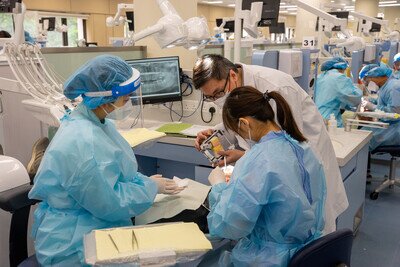Dental AI to Engage the Community
The Covid-related restrictions have highlighted the problems faced by many in the community when it comes to receiving medical treatment in Hong Kong. In particular, many poorer, older citizens fail to get regular dental check-ups as they are unable to see a dentist.

According to the World Health Organisation, severe periodontal diseases affect around 19% of the global adult population, representing over 1 billion cases worldwide. In the recent Oral Health Survey in Hong Kong, more than 86% of older adults who have teeth had half or more of their teeth with bleeding gums. Studies show that the older adults are one of the most vulnerable patient groups for oral health issues.
This has led a team at The University of Hong Kong’s Faculty of Dentistry to investigate whether Artificial Intelligence (AI) could be used to remotely check for inflammatory gum disease or other gum diseases.
The novel concept uses AI technology to detect gum disease by analysing images taken on a smart phone and instantly comparing them with thousands of existing photographs of diseased gums taken by HKU Dentistry. The neural network system then automatically colour codes the gums and “labels” the relevant areas as healthy, questionable or inflamed.
Dr. Walter Lam, Clinical Assistant Professor at the Faculty of Dentistry, at HKU’s Prince Philip Dental Hospital, said they have a high standard for clinical inclusion and exclusion criteria for data-set used to train the AI.


“The AI actually is using the computer to learn decisions or to learn the knowledge from a trained dentist,” he said, “so that the AI, the computer, can perform the same action, or even better action, for the clinical work.”Dr Lam said this means that older adults or patients can check their teeth for gum disease, simply by taking a “selfie” at their home.
As part of the knowledge exchange aspect of the research, Dr. Richard Hsung from the Department of Computer Science at Hong Kong Chu Hai College, an AI specialist, joined the team to input the photos into the neural network and to help develop the system.
“The system has learnt from the photos that we have collected (and labelled by a dentist) before, and it will come out with a coloured label,” Dr Hsung said. “And they will be combined with the original input photos to show the health of the gum.”
Dr. Hsung believes AI is becoming increasingly important because it can help to make diagnoses more effectively and has the potential to be used for checking other parts of the body.
“In the future, we can see that artificial intelligence can be applied to many other areas of the medical field,” he said. “I believe AI can benefit more people around the world.”

